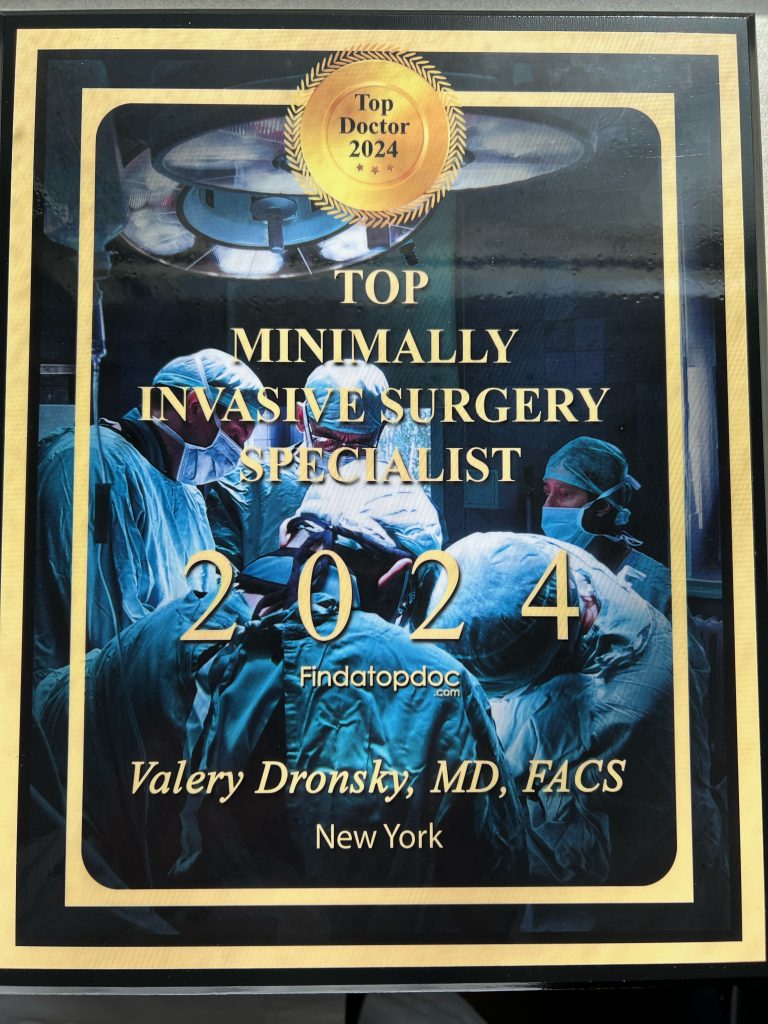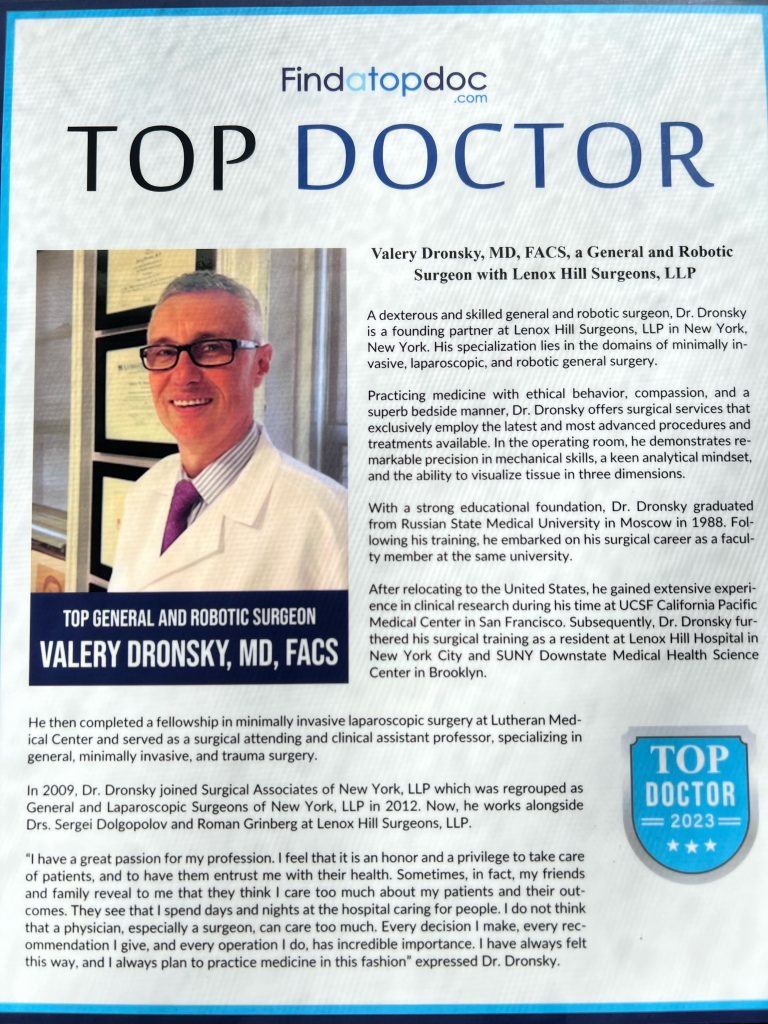CALL TODAY 646-846-1136 | EMAIL
Surgical Experts Dedicated to Improving Lives
At Lenox Hill Minimally Invasive Surgery PLLC, Dr. Valery Dronsky and his staff of medical professionals provide compassionate care with the highest ethical & professional standards. In our state of the art facility, we offer surgical services using only the most cutting edge and current procedures and treatments. We specialize in general surgery, including extensive experience in performing hernia repair surgery. Our expertise is in minimally invasive surgery and robotic surgery. Minimally invasive and robotic surgery often allow patients to experience easier recovery than traditional open surgery. They also allow for more precise and less traumatic surgery. When robotic and minimally invasive surgery is not an option, we are also skilled and experienced in traditional open surgical procedures.
Dr. Dronsky is an experienced and highly skilled surgeon having undergone extensive training in school, residency and fellowships. He practices medicine with ethical behavior, compassion and superb bedside manner. In the operating room he exhibits precision mechanical abilities, analytical thinking and the ability to visualize tissue in three dimensions. These innate and learned skills allow Dr. Dronsky to be one of the most dexterous and skilled professionals in New York City and the Country.
Call us: 646-846-1136
PATIENT TESTIMONIALS
Recent Awards
We are honored and deeply appreciative to have consistently received prestigious awards and recognition year after year, establishing us as one of New York’s foremost hospitals for a wide range of general surgeries, safety measures, specialized procedures, and overall excellence in healthcare. At Lenox Hill Minimally Invasive Surgery, our unwavering commitment lies in delivering exceptional care and unwavering support to our patients, guaranteeing their safety and successful recovery throughout their entire surgical experience.
Hospital Quality Awards
 America’s 50 Best Hospitals Award™ (2023, 2022)
America’s 50 Best Hospitals Award™ (2023, 2022)
Top 1% in the nation for providing the highest clinical quality year over year.

America’s 100 Best Hospitals Award™ (2021)
Top 2% in the nation for consistently delivering clinical quality year over year.

America’s 250 Best Hospitals Award™ (2023, 2022, 2021)
Top 5% in the nation for consistently delivering clinical quality.

Patient Safety Excellence Award™ (2023, 2022)
Top in the nation for providing excellence in patient safety by preventing infections, medical errors, and other preventable complications.
Specialty Clinical Quality Awards

America’s 100 Best Hospitals for Cardiac Care Award™ (2023, 2022, 2021, 2020, 2019)
Superior clinical outcomes in heart bypass surgery, coronary interventional procedures, heart attack treatment, heart failure treatment, and heart valve surgery.

America’s 100 Best Hospitals for Coronary Intervention Award™ (2023, 2022, 2021, 2020, 2019)
Superior clinical outcomes in coronary intervention procedures (angioplasty with stent).

America’s 100 Best Hospitals for Prostate Surgery Award™ (2023, 2022, 2021)
Superior clinical outcomes in prostate removal surgery and transurethral resection of the prostate.
Click to see all of our Healthgrades best doctors awards




Visit our main website at www.LenoxHillMinimallyInvasiveSurgery.com
Blog Posts are Below:
Tag Archives: Treatments
Gastroesophageal Reflux Disease (GERD)
What is gastroesophageal reflux disease (GERD)? If you have experienced acidity or heartburn many times, you are not alone. National Institute of Diabetes and Digestive and Kidney Diseases (NIDDK) reports that 20 percent of American population gets affected by Gasteresphageal reflux diseases (GERD).
More than 15 million adults in the US, especially pregnant women, suffer from heartburn daily. GERD is essentially mild acid reflux that may occur twice a week. However, some people may also experience severe acid reflux, at least once a week.
What Causes GERD to Occur?
Your digestive system is home to several digestive enzymes and acid. Normally, when you eat something, the lower esophageal sphincter (LES), i.e., the lining of the stomach, opens. It allows the food to enter the stomach and then closes. This helps to obstruct the food or any acidic enzymes from flowing back to the esophagus. However, sometimes the LES does not close properly.
As a result, the acid and digestive stomach enzymes flow back into the esophagus. The frequent backward flow of stomach acid, i.e., the acid reflux, may irritate LES, thereby weakening the lining. Hence, if your acid reflux returns multiple times every week, you probably have GERD (Gastroesophageal Reflux Disease).
Symptoms of GERD
The occurrence of the following signs or symptoms may indicate that you are likely to have GERD.
- A sharp or burning sensation in your chest behind the breast bone
- The sensation, also called heartburn, may get worse when you eat, lie down or bend.
- Tightness in the upper abdomen or chest
- Difficulty in swallowing
- Food or sour liquid regurgitation, i.e., the backflow of stomach juices in your oral cavity
- Sore throat
- Developing a sour taste at the back of the mouth
Some people may have nighttime acids reflux and are likely to experience sleep disruption, chronic cough, laryngitis, and worsening asthma. Also, the chest pain may radiate toward the neck at night.
Diagnosis
People, who are obese, have connective tissue disorders, Hiatal hernia, gallbladder diseases, are prone to having GERD. Similarly, pregnant women are prone to the condition.
For the diagnosis of GERD, your doctor may conduct the following tests (as per requirement):
- X-Ray of the Upper Digestive system: the patient gets a barium solution to drink and the doctor conducts an X-ray test to examine the esophagus.
- Esophageal manometry: the doctor inserts a flexible tube into your esophagus to measure the rhythmic contraction of your esophageal muscles when you swallow
- Esophageal pH monitoring: the surgeon inserts a monitor into your esophagus to measure the pH level. Usually, the doctor keeps the patient under observation for one day to see when the acid stomach enters the monitor.
- Upper Endoscopy: the surgeon threads a flexible tube with a tiny camera down your throat to examine your esophagus and stomach. He/she may also collect a sample of the tissue (biopsy).
Treatments
Changing your lifestyle may help relieve the symptoms of GERD. For instance, reducing or abandoning smoking may help. Also, including a balanced diet and avoiding fatty food and certain beverages may work. In mild acid reflux cases, over-the-counter medications can be a good option. Also, your doctor may recommend prescription medications. However, if medicines prove to be of little help, your doctor may suggest a surgical procedure.
Nissen Fundoplication
It is a surgical procedure that exerts pressure in your lower esophagus. The surgeon folds the top of your stomach (partially or completely) around the esophagus. Thus, the stomach is tightened to prevent acid reflux. The surgeon may perform the procedure through conventional open surgery or a laparoscope. However, most surgeons prefer minimally invasive surgery.
Stretta Procedure
It is yet another minimally invasive surgical procedure. The surgeon threads into the esophagus with a small tube and uses radiation to tight the barrier between the esophagus and stomach.
LINX surgery
The surgeon folds a ring of tiny titanium beads around the junction of the esophagus and the stomach. The magnetic force between the beads helps keep the junction closed, thereby preventing the acid reflux. However, the band allows the food to pass through. The surgeons use minimally invasive surgery to implant the Linx device.
So, if you’re facing heartburn or acid reflux frequently and the symptoms are severe, you should seek medical help immediately. Our highly professional team of surgeons at Lenox Hill Minimally Invasive Surgery has expertise in minimally invasive surgery. For consultation, appointment or surgery, contact us today.
LENOX HILL MINIMALLY INVASIVE SURGERY
646-846-1136
Gallstones
Gallstones are not stones. Instead, they are pebble-like solid pieces of digestive fluid that form in the gallbladder. The gallbladder is a small, pear-shaped pouch, found just beneath the liver, on the right side of the abdomen. The small organ stores digestive fluid called bile that flows from the liver to your small intestine.
The salt in the bile helps digest fat easily. It also contains waste products, such as cholesterol and bilirubin. When either of the waste products begins to cluster together as a solid lump, the result is the formation of gallstones. The size of the gallstones may be as large as a golf ball, or as small as a pearl.
Types of Gallstones
Two main types of gallstones that can form in the gallbladder include:
Cholesterol Gallstones
These are the most common types accounting for 80% of gallstones in the US citizens. The cholesterol gallstones are yellowish-green in color. They mainly comprise un-dissolved cholesterol, but may also contain other components.
Pigment Gallstones
Pigment gallstones are smaller and dark brown or black. When there is excessive amount of bilirubin in the bile, it forms pigment gallstones.
Symptoms
Gallstones often cause no signs or symptoms. The patient might not be aware of a gallstone’s existence unless a doctor diagnoses it. Nearly 20% of American adults may have gallstones, yet only around three percent of them develop any symptoms.
The symptoms start to appear when a gallstone lodges into a duct, causing a blockage. Hence, you feel excruciating pain in the upper right part of the abdomen. The pain may last from a few minutes to a few hours, or may come back in episodes, referred to as an “attack.”
You might experience pain in:
- Your right shoulder
- The center of your abdomen, just below the breastbone
- Back pain radiating between your shoulder blades
Or other signs like:
- Nausea or vomiting
- Digestive problems like bloating, heartburn, belching
- Intolerance for greasy food
- Jaundice and weight loss
Causes
Many reasons may cause you to have gallstones, including your weight, genes, diet, and gallbladder issues.
- The human body needs bile, but sometimes the liver excretes more cholesterol than the bile can dissolve. Thus, it may lead to crystal or gallstone formation.
- Bilirubin is another chemical produced during the breakdown of red blood cells. When the liver makes excessive bilirubin, it causes gallstones.
- When your gallbladder does not empty properly, the bile becomes concentrated, thereby forming gallstones.
Risks
Certain factors make people susceptible to gallbladder issues, especially gallstones. The people who are at risk include:
- Women, especially those who are pregnant, using birth control pills, or undergoing hormone replacement therapy
- Obese or overweight people
- People on a crash diet
- Diabetic patients
- Those using cholesterol-lowering drugs
Treatments
Silent gallstones usually don’t require any treatment. For the diagnosis, the doctor may draw a blood sample, recommend an ultrasound, endoscopy, or CT scan. However, if the symptoms appear, the patient may have to get the gallbladder removed through surgery.
Cholecystectomy
Cholecystectomy is a common procedure for gallbladder removal. The surgeon makes incisions in the abdomen and passes the surgical instruments, a light, and a camera for images, through the cuts. The doctor monitors the video and removes the gallbladder safely. After the surgery, the bile flows from your liver to the intestine directly. The patient may go home the same day following the surgery.
In open cholecystectomy, the doctor has to make bigger cuts to remove the gallbladder. Hence, the patient may have to stay in the hospital for a few days.
Medication
If surgery is not the best option for you because of your medical condition, then oral medications may help dissolve the gallstones. The doctor may prescribe Ursodiol (Actigall, Urso 250, Urso Forte), Chenodiol (Chenodol), or both. However, the process may take months or years. Thus, the gallstones may form again if the patient does not take the medication regularly.
Final Thoughts
Removing a gallbladder has no harmful effects on your digestion ability, and you can survive without a gallbladder. Our dedicated team of surgeons at Lenox Hill Minimally Invasive Surgery uses the cutting edge technology and current procedures for a safe removal of the gallbladder. Contact us today if you have any of the symptoms stated above.
LENOX HILL MINIMALLY INVASIVE SURGERY
646-846-1136
admin@lenoxmis.com















